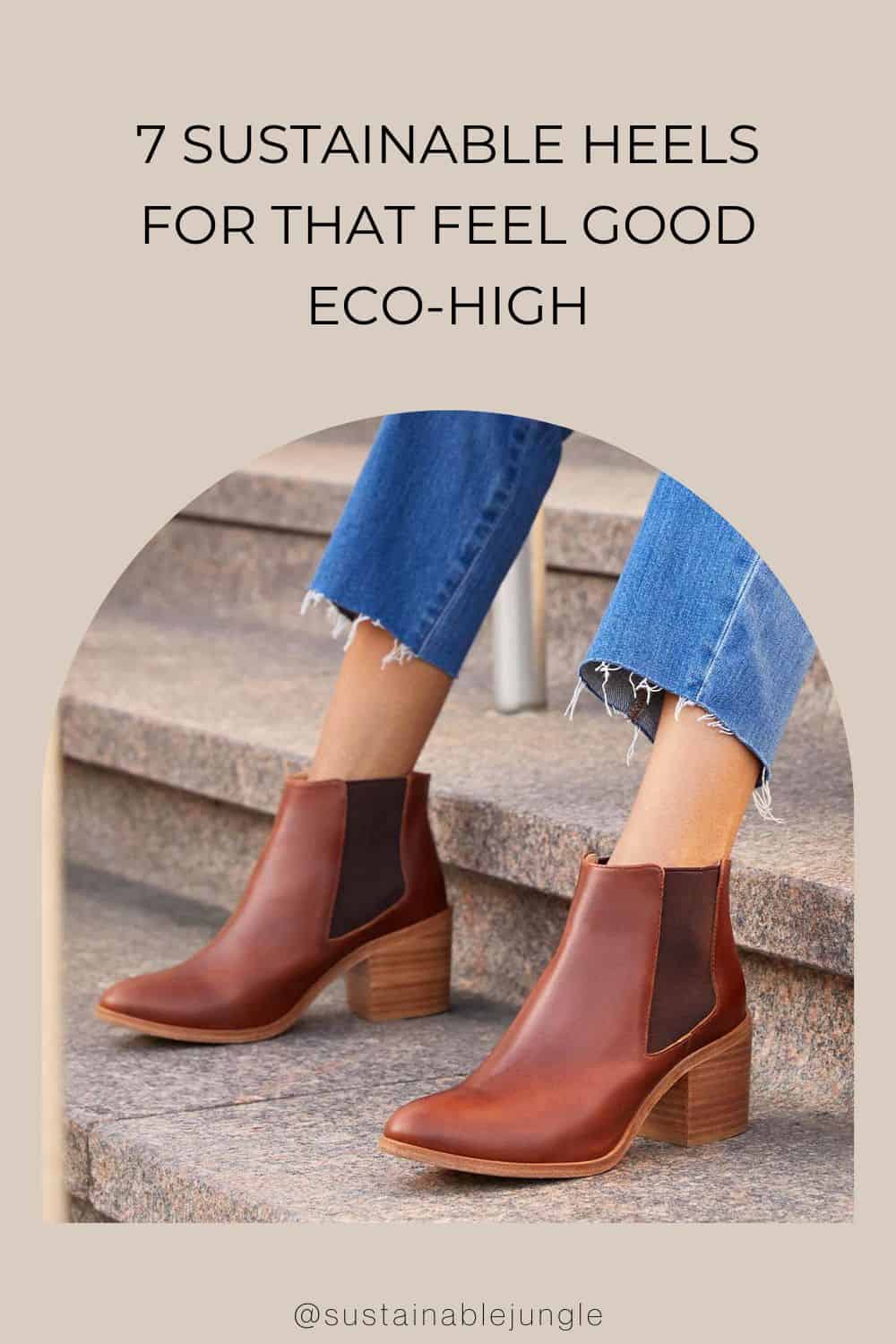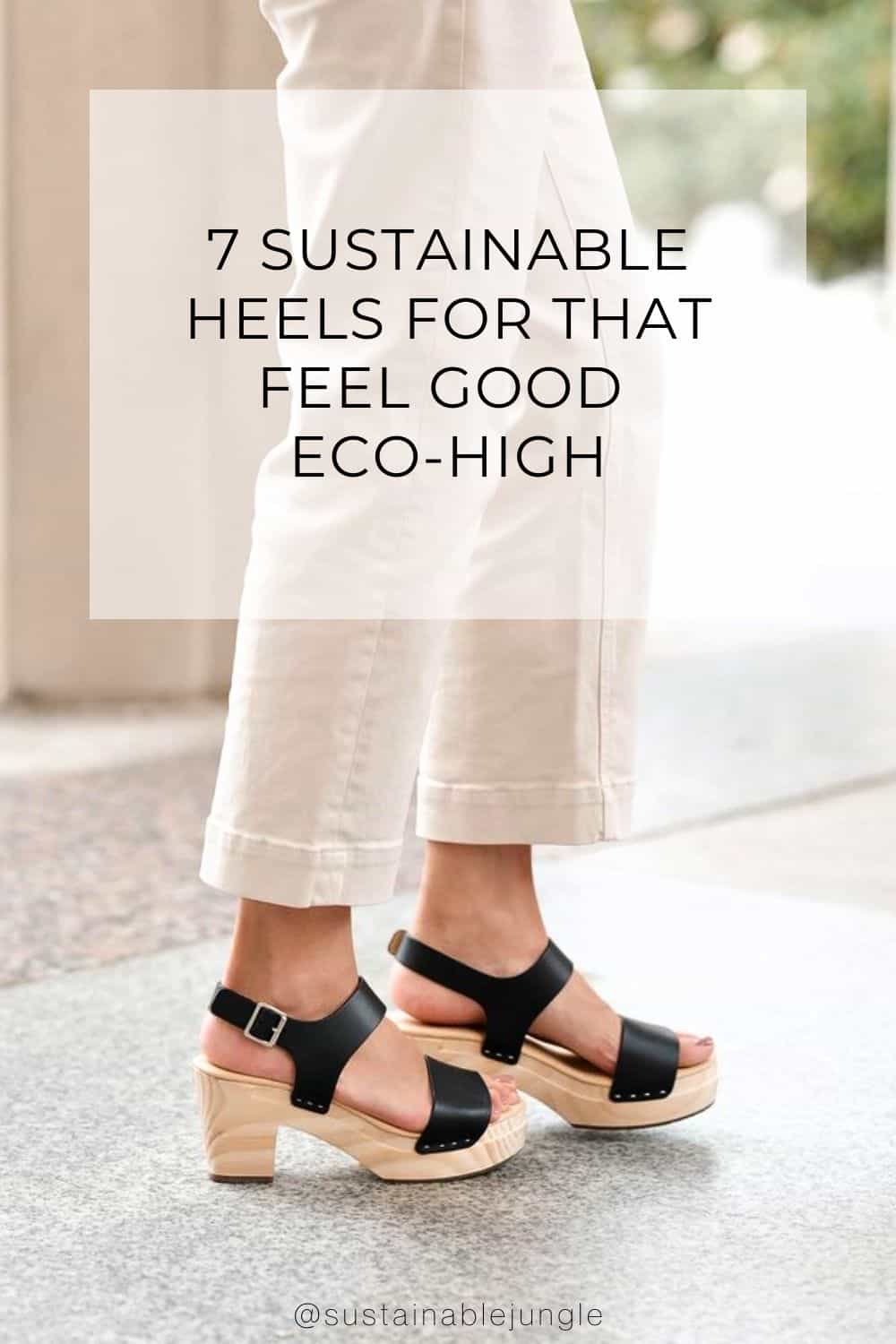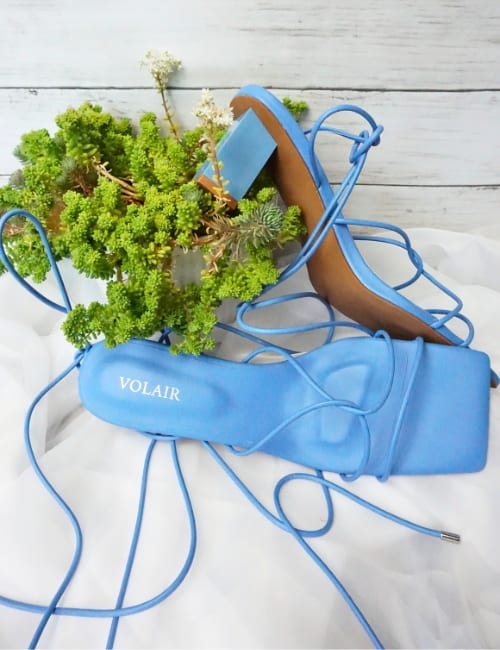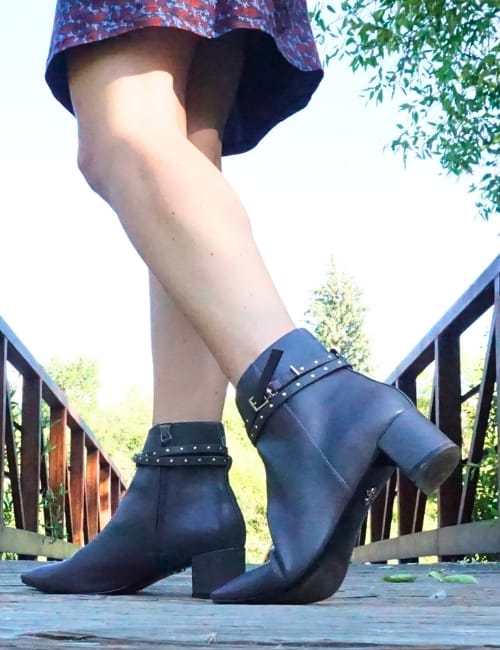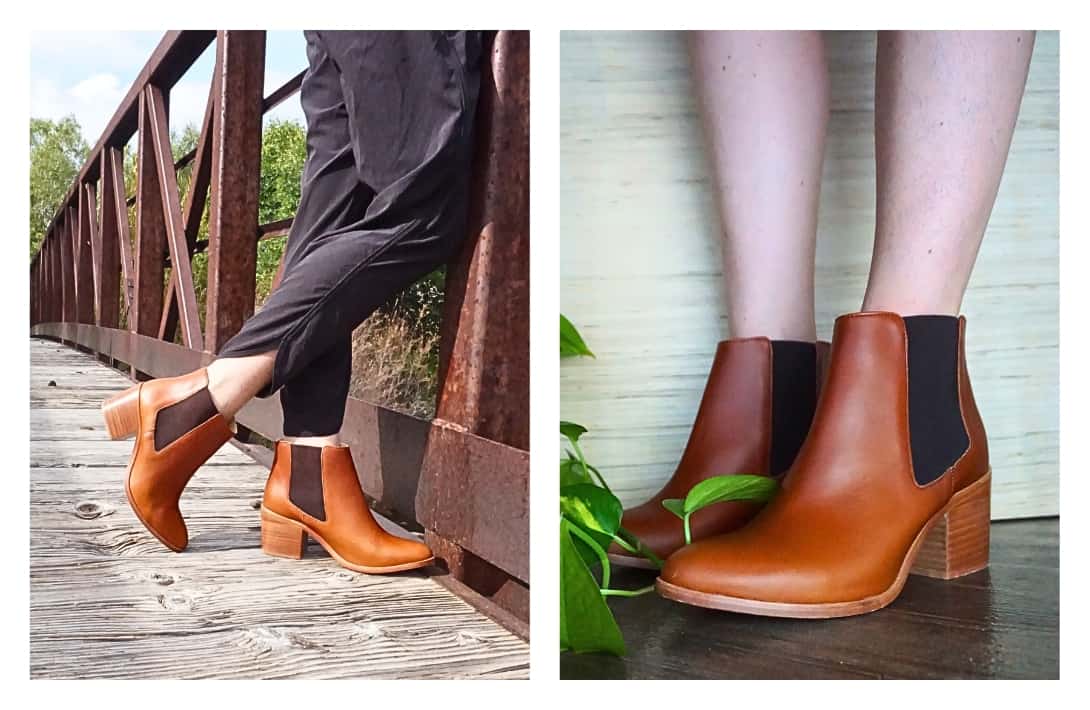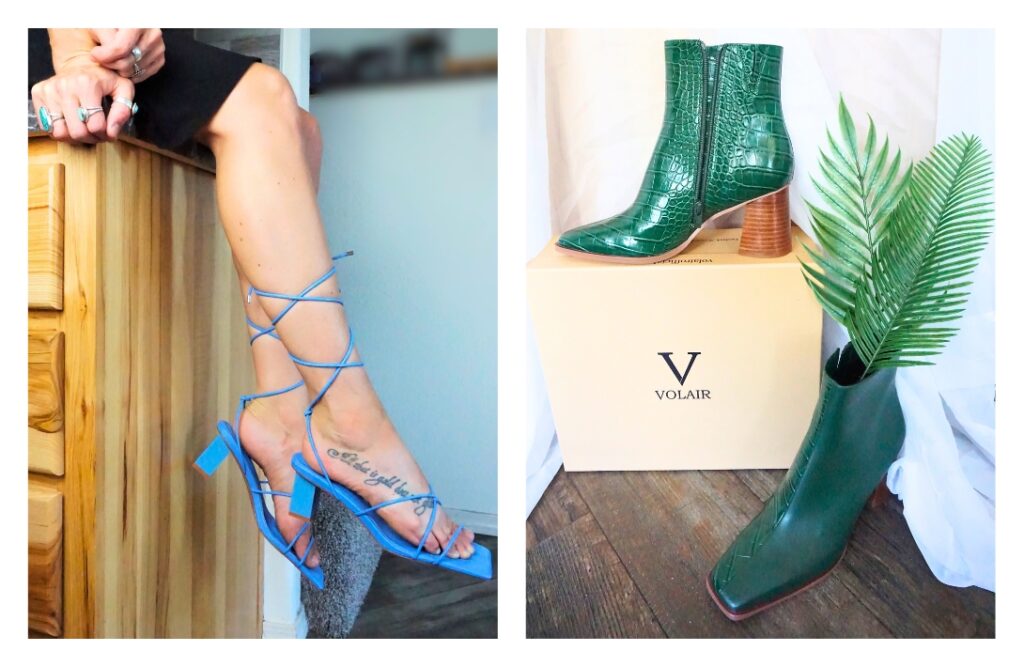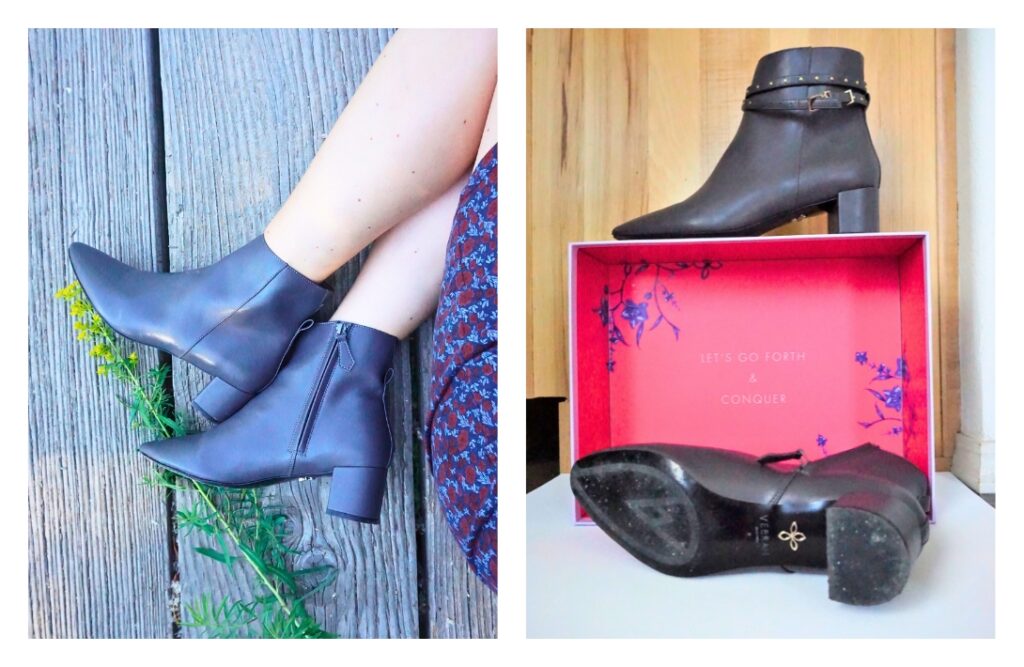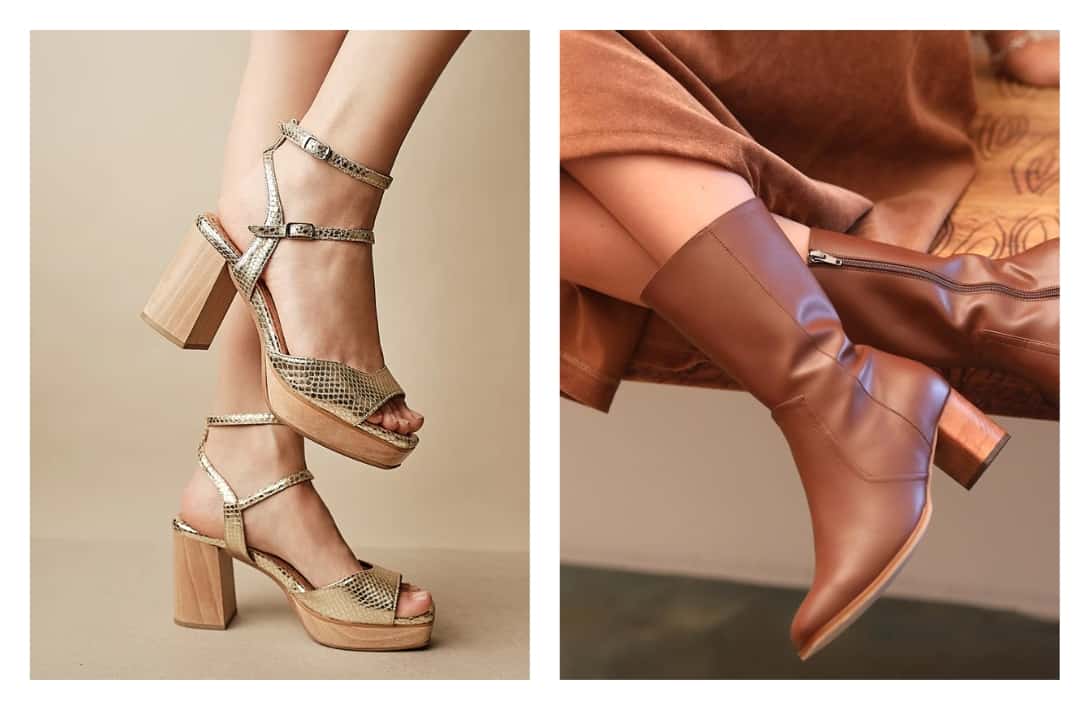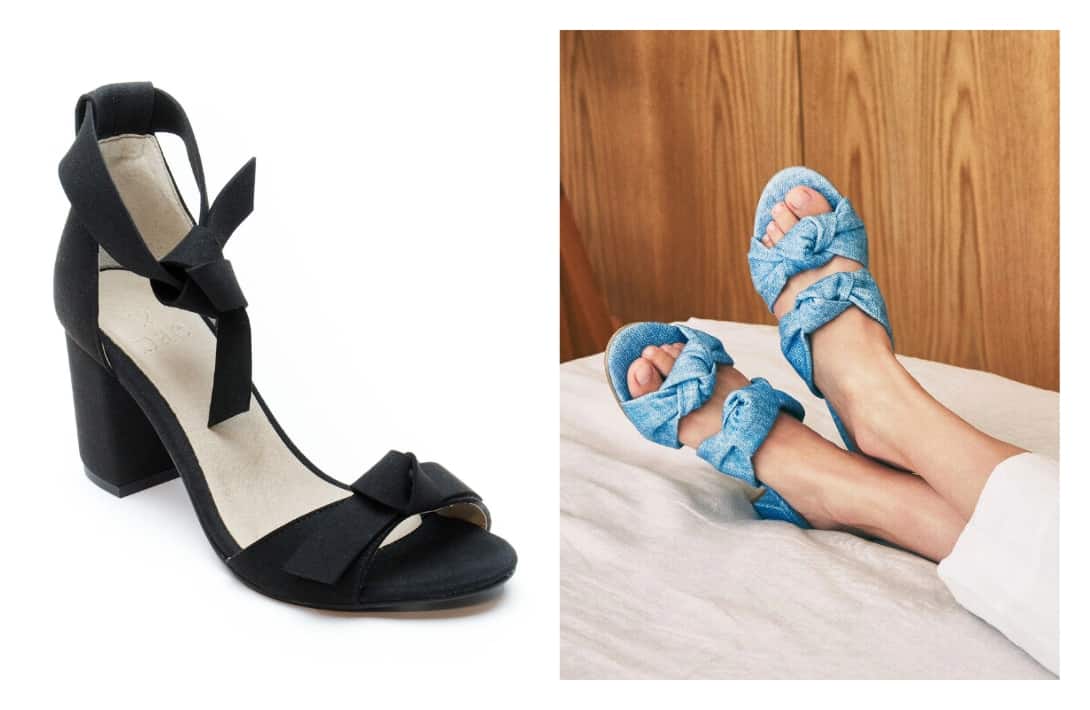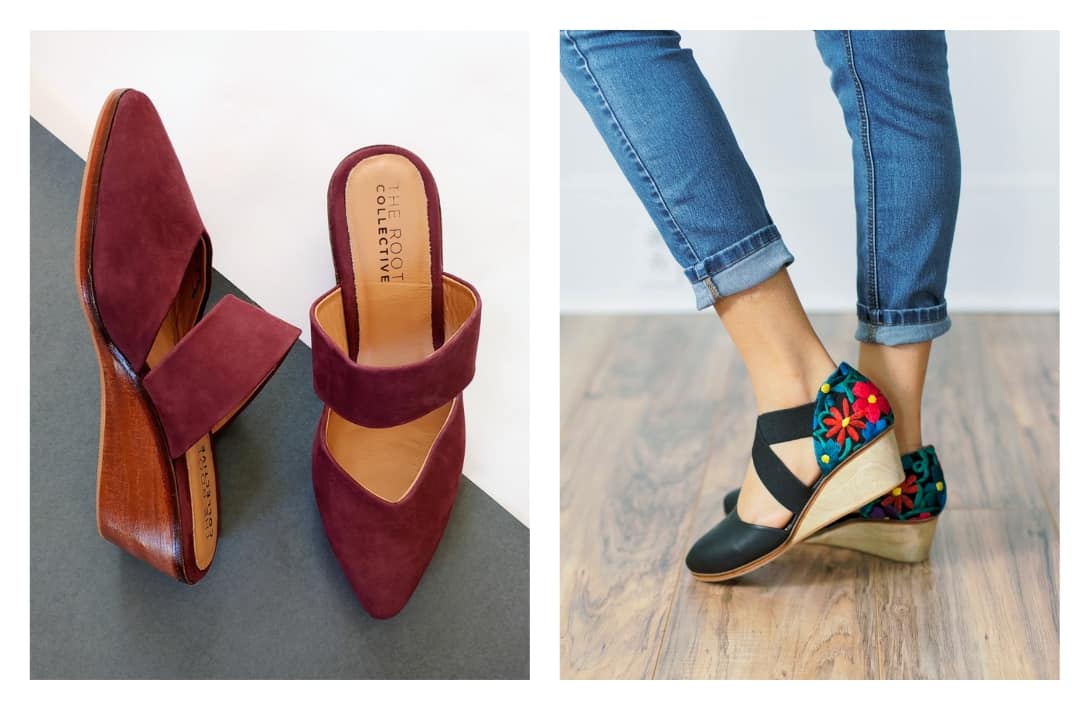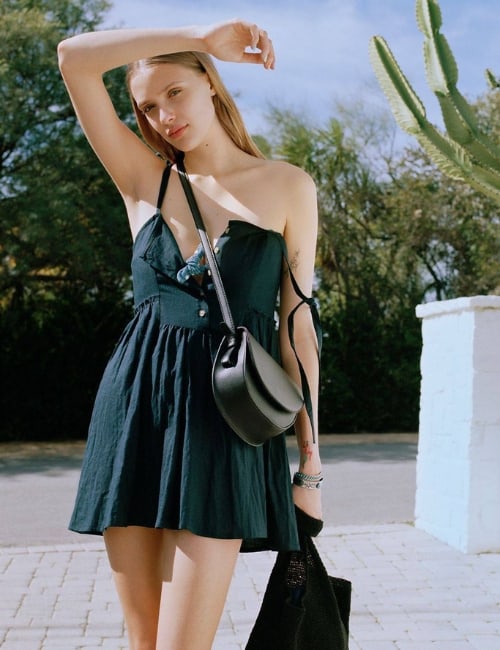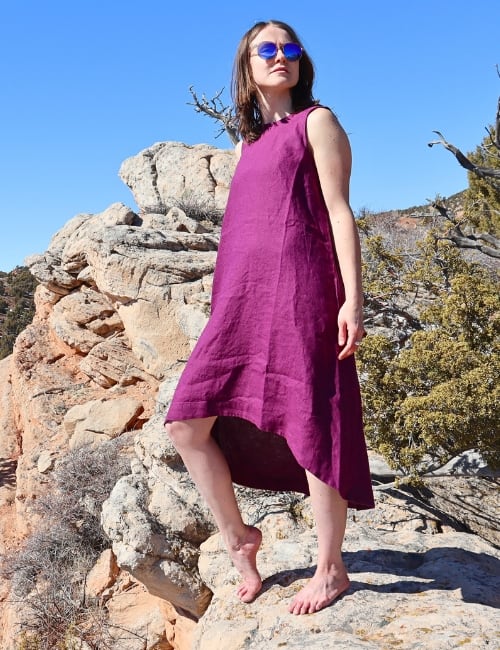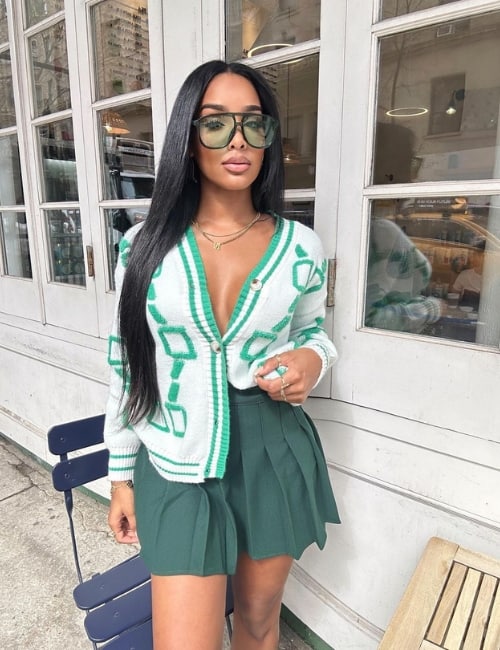7 Sustainable Heels For That Feel Good Eco-High
We should be keeping our heels, heads, and standards high.
Which is why dressing up with ethical and sustainable heels should be the only way to elevate your style—literally!
The footwear industry is no stranger to exploitation, forced labor, and unsafe working conditions. Add in conventional leather high heels and you get animal cruelty, too.
That’s why we’re making like a pair of 7” heels and stepping up to create this list of seven better ethical shoe brands, starting with the top high heel brands we’ve fallen head over (eco) heels for.
Everything we recommend to you on Sustainable Jungle is independently researched and we ask all brands to confirm their claims. To avoid waste, we test products on an as needed basis. This post contains affiliate links. If you buy something through our links, we may earn a small commission. Learn more about why we do this here.
Sustainably Strut Your Stuff With The Best Heel Brands
No list of ethical heels brands is complete without Nisolo, maker of truly sustainable leather high heels and the brand behind The Lowest Wage Challenge, increasing the shockingly low percentage of workers who receive fair wages.
Volair puts the flair in sustainable vegan leather with flashy yet functional shoes made of apple peels and other recycled materials.
Click clack your way to the end of the article to learn more on how to buy eco-friendly heels.
The Full List Of Ethical Heels Brands For Women
- Nisolo | Visit Store
- Volair | Visit Store
- VEERAH | Visit Store
- Bhava | Visit Store
- Matisse | Visit Store
- NAE | Visit Store
- The Root Collective | Visit Store
1. Nisolo
About Nisolo
Price Range: $170–$240
Nisolo is a Certified B Corp that wants us all to walk a little more sustainably.
In addition to their ethical leather heels, they also have sustainable sandals, boots, flats, mules, oxfords, loafers, and other accessories for both men and women.
Between beach days in block heel sandals and boardroom meetings in classy clogs, Nisolo is master of the comfortable and down-to-earth everyday heel—in earthy colors to boot (er, heel).
Take the Heeled Chelsea Boot, for instance.
With a 3” heel height, breathable and water-resistant upper, and memory foam cushioned insoles, these mostly natural heels are a natural choice for those seeking something versatile for all seasons and occasions.
Nisolo’s Ethical & Sustainability Practices
Materials:
Nubuck leather with a rubber heel cap is what you’ll find in Nisolo’s range of women’s shoes.
Nubuck is a top-grain calfskin or cowhide leather that is tougher and more resilient, but feels similar to suede. Theirs is sourced strictly as a byproduct of the food industry.
Because leather is an ethically tricky material, they personally visit all partner factories and tanneries, 95% of whom are certified by the Leather Working Group ( LWG).
The heels and midsoles feature real wood.
Supply chain & labor practices:
All sustainable high heel manufacturing takes place in their own Peruvian factory, which is third-party verified for living wages and ethical conditions.
This repairable shoe brand is actually behind The Lowest Wage Challenge, which is how they’re encouraging other fashion brands to transparently share their lowest paid wages so that improvements can be made.
Supporting workers more (whether in Peru, Mexico, Kenya, or Nashville, USA), they provide access to training, healthcare, and safe and supportive working environments.
Carbon commitments & green practices:
Nisolo reduces and offsets 100% of their carbon emissions, making them a Carbon Neutral company.
They also have a Shoe Reclamation Program that allows customers to return their old Nisolo shoes, so some components can be either upcycled, recycled, or donated through Soles4Souls.
Check out their Impact Report to see exactly what they’re accomplishing.
Community & charitable giving:
Nisolo has revolutionized the way fashion brands can support independent artisans and create opportunities for underserved communities.
2. Volair
About Volair
Price Range: $95–$175
Looking for ethical and sustainable heels that “lets you dance all night pain-free”?
Then veer your search toward Volair.
Among their small but staple range of vegan ethical shoes, heels are the focus, including low heel sandals, heeled boots, and two mid-height heels with different ankle strap designs.
Testing two of these affordable heels had us feeling at the height of luxury.
First, we tried out the Reverie Sandal, which Volair calls the “perfect combination of style, comfort and poise”—and we can’t help but agree.
For such a minimalist heel, we’re impressed by how stable they are, attributed to both the chunky, modest-height 2.4” heel and contoured footbed.
While it took us a few tries to initially figure out how best to tie the ankle straps, we caught on quickly and appreciate how the long ties can be styled in a variety of ways.
If you want a pair of extra comfortable eco-friendly heels, we recommend the Harley Boots.
Featuring a unique but still understated bi-pattern design that’s half faux croc skin and half matte faux leather, these heeled ankle boots are not only incredibly easy to pair with a variety of outfits, but we also found them comfortable enough to walk long distances, making them a modern essential.
Volair’s Ethical & Sustainability Practices
Materials:
Volair’s eco-friendly high heels all feature a bio-based vegan apple leather or corn leather upper combined with heels that are either made of recycled materials or bio-based polymers that replace the traditional ABS material.
This polymer is BPI compostable certified and Vincotte OK Compost Industrial/Home certified.
The uppers are also PETA, REACH, and USDA Biobased certified.
Supply chain & labor practices:
All heels are manufactured in Asia, with a manufacturer that aligns with ethical business practices, and they ensure all suppliers have the proper certifications.
We have put the shoes through the standard tests such as fatigue resistance test, slip resistance test, etc.
Carbon commitments & green practices:
As proponents of slow fashion, Volair encourages a pre-order sustainable production model to prevent the waste associated with excess stock.
They also use recycled and recyclable packaging and offset their shipping emissions through Carbonfund.org. Their “North Star is to create a fully sustainable product with a net zero carbon manufacturing”.
3. VEERAH
About VEERAH
Price Range: $268–$328
VEERAH doesn’t want you to sacrifice style to be sustainable–and with their designer eco conscious heels, you can get both.
The name of this vegan shoe brand comes from veerabhadrasana, Sanskrit for ‘warrior pose’, and we can all be eco warriors in the brand’s ethical heels, boots, flats, and sandals.
Our personal favorite is the HEDY Ankle Boot, named after female powerhouse, actress, and inventor Hedy Lamarr (FYI: all their models are named after inspiring women throughout history).
We got to try these heeled boots ourselves and even put them to the test as our sole pair of shoes on a long day of running errands and guess what…we managed to keep them on ALL day!
Finding truly wearable heels (at least for us) can be challenging, so we’re really happy to report these cute and classy boots surpassed our comfort standards, too.
PS: these are excellent sustainable wide heels if you have wider feet like we do.
They also have a bridal collection to go along with your eco-friendly wedding ring.
VEERAH’s Ethical & Sustainability Practices
Materials:
VEERAH’s vegan materials are 100% cruelty-free, PETA-approved, and include the following materials: apple leather, polyurethane, bamboo leather, algae foam, resin-coated rubber, and recycled plastic (like the rPET zippers).
Their apple leather is bio-based and made from organic Italian apples that are a byproduct of the apple juice industry. Apple peels are treated with a non-toxic pigment and blended with 50% polyurethane for waterproofing and durability.
Using an algae foam cushion allows VEERAH to assist in cleaning waterways from toxic algal blooms. This replaces 30% of the petroleum typically found in foam.
Because it’s extremely difficult to make ethical vegan heels without plastic, VEERAH uses renewed plastic as much as possible.
The linings are organic cotton or TENCEL™ lyocell fabric.
Supply chain & labor practices:
The women-led design team spent years looking for manufacturing partners committed to sustainability.
Their production is based in Guangdong, China and New Taipei City, Taiwan —home to many highly-skilled footwear artisans. Workers are paid above a living wage in accordance with ILO standards.
Carbon commitments & green practices:
Instead of buying several pairs of shoes, VEERAH shoes can come with removable accessories that spice up a single pair. Perfect for a minimalist wardrobe.
The included protective dust bag and reusable storage sack is made entirely from recycled plastic bottles.
Inclusivity:
VEERAH is woman-founded and “led by women, for women”.
Community & charitable giving:
VEERAH’s 1-10-100 battle plan means:
- 1% of revenue is donated to social impact causes
- 10 paid hours are offered for employees to either volunteer or take self-improvement courses
- For every 100 customer feedback surveys, a one-year scholarship is given to a She’s the First girl scholar.
4. Bhava
About Bhava
Price Range: $245–$275
Bhava believes we need to get creative when it comes to finding alternatives to leather.
You won’t find any products of animal-origin in their range of sandals, sustainable flats, heels, and boots.
When it comes to sustainable heels, women’s styles include pumps, mules, loafers, strappy heels, and sandals.
If you’re looking for some eco nude heels, Bhava is all about soft neutrals—like the LOLA Platform Sandal, sure to become your favorite fun and flirty sustainable block heels.
Because they “don’t produce a single pair of Bhava shoes without a thorough NYC test drive for comfort and durability” you’ll actually love wearing these heels (rather than only love the moment you can kick them off!).
Bhava’s Ethical & Sustainability Practices
Materials:
Bhava uses solid wood heels, cork insoles, organic cotton linings, and Italian-made vegan leather that is free of PVC, phthalates, chrome, azo-dyes, formaldehyde, and aromatic amines.
Supply chain & labor practices:
Making use of the region’s long history of handmade shoes, Bhava works with artisans in Alicante, Spain.
A few are made in India, by the country’s first woman-owned footwear company.
Many of their materials are imported from Italy and their cork from neighboring Portugal.
Carbon commitments & green practices:
A relatively localized supply chain, mostly on one continent, helps keep carbon emissions and waste at a minimum.
5. Matisse
About Matisse
Price Range: $40–$190
Matisse is one of the most popular heel brands in the sustainability sphere, and it’s easy to see why.
Their sustainable, inexpensive heels meet the needs of modern women—and the needs of our planet and the people on it.
From beach to street, Matisse provides artisanal, ethically-made mules, boots, flats, sandals, sneakers, and both vegan and leather heels.
For a pair of sustainable retro heels, the Louie Platform Loafer sure isn’t your grandma’s loafer. They take the class and professionalism of them, and add a little height and a modern twist that goes well with just about any outfit.
Matisse’s Ethical & Sustainability Practices
Materials:
Leather, suede, and EVA (a rubber-like plastic polymer) are common materials, combined with rubber outsoles and sometimes wood heels.
Whenever possible, recycled leather and textiles are used.
They also offer vegan heels made of PETA-certified PU vegan leather, not PVC.
Supply chain & labor practices:
All manufacturing partners are family-owned and operated and are regularly audited to ensure workers are treated fairly.
Carbon commitments & green practices:
Their leather tannery partners use technology to minimize watershed waste, but we haven’t received a response yet with more details on how they process their leather.
6. NAE
Price Range: $120–$155
About NAE
With a name that stands for “No Animal Exploitation” it’s no wonder we’ve fallen head over sustainable heels for the vegan eco high heels from NAE.
Their range is absolutely huge, encompassing not just heels, but sandals, sneakers, sustainable boots, flats, and more, for both men and women.
Among their vegan heels, you’ll find staple styles—like these cute and classy peep toe pumps—as well as more unique ones.
NAE’s Ethical & Sustainability Practices
Materials:
A huge range of sustainable materials means a huge range of vegan fabrics, including Piñatex, cork fabric, apple leather, recycled PET (sometimes blended with corn), organic cotton, and traditional PU and PLA vegan leather.
Some materials bear OEKO-TEX certification.
Supply chain & labor practices:
As a Spanish brand, NAE chooses to manufacture locally in Spain and Portugal.
Carbon commitments & green practices:
Heel manufacturing is carbon-neutral and mindful of chemical and water use.
7. The Root Collective
About The Root Collective
Price Range: $178–$278
The Root Collective is a “people company that happens to sell shoes and accessories”.
It was founded by Bethany Tran, whose purpose-driven dreams weren’t being satisfied by her job at a Fortune 500 company.
So she started working with Guatemalan artisans and selling shoes around the globe.
In addition to comfortable ethical heels (in the form of wedges and heeled chukka boots), the brand also sells flats, boots, sandals, and bags.
Dreaming of sustainable espadrille heels?
We adore the combination of the classic black leather toe and colorful, hand embroidered floral heel in the Chloe Wedge.
The Root Collective’s Ethical & Sustainability Practices
Materials:
LWG-certified leather and handwoven fabric are combined with a wood and natural rubber outsole.
Supply chain & labor practices:
Social impact is what drives The Root Collective, They exist to support community jobs.
Partnering with small, independent Guatemalan workshops, they’re able to support talented artisans with wages 40-500% above the fair trade wage minimum.
The handwoven fabric comes from two women’s cooperatives, and other steps of the manufacturing take place in other small workshops and factories in Guatemala.
Carbon commitments & green practices:
In addition to small batch manufacturing, TRC prevents product waste through their Root Seller resale platform.
Did you know we Have a Newsletter?
We cover the latest in sustainable living, fashion, zero waste, beauty, travel, finance and more…
How We Found These Eco-Friendly High Heels
Looking for the best sustainable fashion brands means looking at not just sustainable fabrics, but also how those are transformed into products like ethical heels.
We want comfortable heel brands for us as well as for the planet and the people who made them.
Materials:
As Lizzie McGuire once sang, this is what heels are made of (or something like that).
Fortunately, unlike other sustainable shoes, heels tend to be a little simpler on the material front (as opposed to say, sustainable running shoes, which have so many different components to meet performance needs).
We ideally look for natural materials like organic cotton, cork, natural rubber, algae foam, and some innovative materials like Piñatex and apple leather (though the latter are still not biodegradable because they’re coated in PU for durability).
When it comes to synthetic fabrics like PU (a type of plastic) and EVA foam, they do come with some environmental concerns, but are better than their alternatives—like highly toxic PVC. It’s also far less toxic to soil and water and can even be recycled.
For some, the animal welfare concerns make vegan leather the clear winner. For others, the environmental impact and limited durability of synthetic materials is a big no-no.
Though leather has some concerns, we don’t automatically discount it.
For heels that will be worn for decades to come, natural ethical leather provides the most durable option. It’s best to look for vegetable-dyed or at least chrome-free leather, as it’s free of many of the toxins and heavy metals typically found in leather.
Recycled leather is clearly the best option, but traceable, byproduct leather is the next best thing.
- Certifications: Leather Working Group (LWG), People for the Ethical Treatment of Animals (PETA), OEKO-TEX, Registration, Evaluation, Authorisation, and Restriction of Chemicals (REACH), USDA BioPreferred
Supply chain and labor practices:
Our feet might hurt after a long day in heels, but our conscience can feel good about significantly higher-than-fair wages or 100% living wages, support for independent artisans (especially women), family-owned factories, and brands that provide healthcare, training opportunities, and safe working environments.
Ideally, we’d love to see more US-made eco-friendly heels, but currently, most production is still globally spread.
- Certifications: B Corporation (B Corp), International Labour Organization (ILO)
Carbon commitments & green practices:
While ethical supply chains were the main focus for this roundup, many sustainable brands are also making use of carbon offset programs, circular programs to recycle/donate shoes, efforts to reduce waste and water and chemical use, and closed-loop manufacturing processes.
Community & charitable giving:
We love it when brands make donations to social impact or environmental causes or provide paid employee volunteer days.
Final Thoughts On Sustainable High Heels
When it comes to sustainable shoe brands, heels are (literally) high on the list of modern essentials.
Because for some occasions, there’s no better pair of shoes than heels… as long as they’re not stepping on anyone’s toes—besides your dance partner’s, anyway.
To make your new footwear even more ethical, first have a look for a secondhand pair from one of the many online thrift stores. But when an upgrade is necessary, however, consider supporting one of these ethical heels brands.
Now it’s high time you hit the town, so strap on those ethical black high heels to match your little black sustainable dress!
A night out is always more fun with friends, so be sure to share this article with them to ethically elevate their style.
Pin these:
